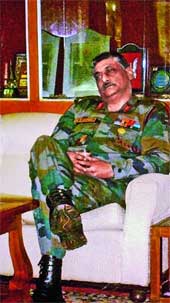
Guwahati, Nov. 10: Assam chief minister Sarbananda Sonowal has directed police and prosecutors to build a "watertight" case in the APSC cash-for-job scandal, so that the guilty cannot take advantage of any loophole in the law to escape punishment.
An official source said the chief minister has directed the police and public prosecutors to sit together and prepare a strong case diary to ensure the accused persons do not get bail from the court.
"Sonowal has taken a keen interest in this case since it is a very sensitive one with huge ramification and can be expanded to cover more people involved in the corruption related to the recruitment exam conducted by the APSC," he said. More arrests are likely.
The state government has appointed noted criminal lawyer Bijon Kumar Mahajan as the special public prosecutor for this case and has also formed a three-member team of senior police officers, led by additional director-general of police (CID) A.K. Jha, to monitor the investigation.
"Since the court usually decides on granting bail to the accused after perusal of the case diary, it is important that an up-to-date and a strong case diary is prepared and also the chargesheet is filed within the stipulated time to prevent the accused from getting bail," the source said.
The source said during interrogation, APSC chairman Rakesh Kumar Paul and member Samedur Rahman had taken names of politicians, including a Congress Rajya Sabha MP, serving bureaucrats, police officers and persons from the media, who had pressurised them to manipulate the results for recruiting family members in the police and civil services, among other government jobs. Investigators said the beneficiaries of the APSC scandal were mostly the influential and moneyed section of the society.
Samedur is lodged at the special branch headquarters while Paul is being detained at the headquarters of fourth Assam police battalion at Kahilipara here.
The police are now on the lookout for a veterinary doctor, a subsidiary intelligence bureau inspector, one of Paul's family members and one of his drivers, as they had allegedly acted as middlemen between the job aspirants and Paul and Rahman.
According to the source, digital/electronic evidence will play an important role in this case apart from other evidence. "The investigators are trying to collect electronic evidences such as transcripts of the conversations between the accused persons on their mobile phones, text messages, emails and so on which contains the roll numbers, details of the candidates and money collected from them, which will be used by the prosecution to nail down the accused during trial," the source said.
"The Indian Evidence Act, 1872, and Information Technology Act, 2000, grants legal recognition to electronic records and evidence," the source said.#"Since the success of prosecution largely depends on the quality of evidence presented at the trial, the evidence will have to be properly examined at forensic laboratories and then presented before the court," he said.











